Conor McCabe wrote the first blog on this website on March 11th, 2011, as a guest contributor. Now anyone who reads his regular blogs on the Dublin Opinion website can hear him in person next Friday, September 14th, when he gives a talk on the Great Railway Strike of 1911 and its unusual impact in a Dublin docklands community.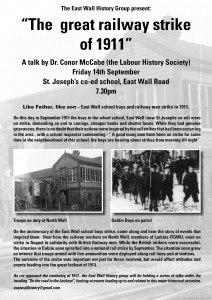
Padraig Yeates on September 9, 2012 | Filed Under Uncategorized | Comments Off on A Rail Strike and a Children’s Crusade in Dublin, 1911
Thomas Leahy is one of the most interesting minor figures in labour and republican circles in the period from 1912 to 1923. His story does not involve the Lockout at all, except through attending meetings in Barrow-in-Furness, where he was apprenticed in the shipyards as a riveter. Speakers included Larkin and Connolly. He is good on the various Irish political movements in Britain before returning to Ireland to avoid conscription in 1914, and later on describing the local scene in Dublin.
In Dublin he joined the Irish Citizen Army. He was instrumental in founding the Irish Engineering, Shipbuilding and Foundry Workers Trade Union in 1920, which lured most craft workers in the south away from their parent unions in Britain.
He took the Anti-Treaty side in the Civil War and returned to Britain as he could no longer find employment in Ireland. He spent the latter half of his working life in Britain, first in Swansea then on Clydeside. He represented his old union, the Boilermakers, on the Committee on Production set up for the shipbuilding industry during the Second World War. There is a certain poignancy about the story of a man who spent his youth trying to break the connection with Britain, especially for Irish trade unionists, only to end his days as a leading activist in his old union on Clydeside. He was typical of many activists in the independence movement who had little to show for the risks taken and sacrifices made. He found some fulfillment through his continuing work in the labour movement.
We are indebted to Eve Morrison for this statement.
http://www.bureauofmilitaryhistory.ie/reels/bmh/BMH.WS0660.pdf
Padraig Yeates on September 8, 2012 | Filed Under Uncategorized | Comments Off on From Barrow in Furness to the Clyde, via Dublin
Given the response to our posting of the Young Jim Larkin and, more especially the Helena Molony Witness Statements on the wwww.1913committee.ie website, we are going to post other Witness Statements from the Bureau of Military History that have a strong link with 1913 and, or the labour movement of the period.
We start with William O’Brien, not just because he was probably the most significant figure in the Lockout of 1913 after Larkin but because he played the leading role in salvaging the ITGWU from destruction after 1916, allying it Dail Eireann from 1919-1921.
He also tells a good story, if not exactly one motivated by generosity of spirit towards his enemies. Perhaps the most interesting admission he makes is that he was a member of the revolutionary IRB 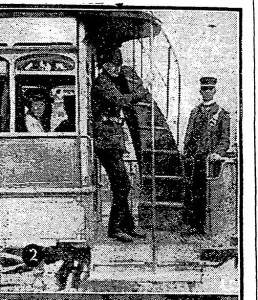
http://www.bureauofmilitaryhistory.ie/reels/bmh/BMH.WS1766.pdf
Padraig Yeates on September 6, 2012 | Filed Under Uncategorized | Comments Off on A Witness to the Lockout and much more
Quite a number of witness statements to the Bureau of Military History refer to the 1913 Lockout. Here are links to statements by Young Jim Larkin and Helena Molony. Young Jim’s speech was primarily an act of remembrance but it encapsulates the values of the workers very well. (Please note Bloody Sunday was August 31st, not August 30th as stated in the text). Helena Molony’s statement is of far greater historical importance and spans a much longer time span and range of issues. She is particularly good on the role of individuals, assessing them well and leaning generally on the side of generosity where she felt neutrality was not an option. She championed James Connolly’s role in 1913, and subsequently, rather than Big Jim Larkin’s. She is also very interesting on Countess Markievicz.
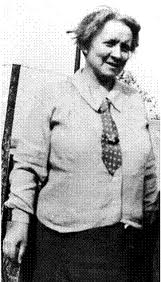
Helena Molony has a great story to tell
Jim Larkin: ‘A city of genteel dastards and bellowing slaves’
http://www.bureauofmilitaryhistory.ie/reels/bmh/BMH.WS0906.pdf
Helena Molony: ‘A counter blast to the orgy of Flunkeyism’
http://www.bureauofmilitaryhistory.ie/reels/bmh/BMH.WS0391.pdf
Thanks to Peter Rigney of ICTU for bringing these to our attention
Padraig Yeates on September 4, 2012 | Filed Under Uncategorized | Comments Off on Young Jim Larkin, Helena Molony and 1913
The History Show on Near FM has broadcast a discussion on the Dublin Lockout involving The Irish Story’s John Dorney, Cathal Brennan and Padraig Yeates.
It is on The Irish Story Archive at
http://www.theirishstory.com/2012/08/24/discussion-of-the-lockout/?utm_source=feedburner&utm_medium=feed&utm_campaign=Feed%3A+TheIrishStory+%28The+Irish+Story%29#.UEDj19aPWtg
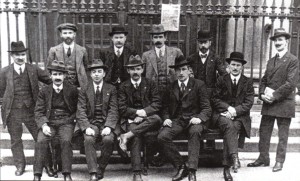
ITUC Executive 1914 – Can you name them?
Padraig Yeates on August 31, 2012 | Filed Under Uncategorized | Comments Off on Near FM Programme on 1913 Lockout
Thanks to Cedar Lounge Revolution for drawing our attention to this extended RTE documentary on the Limerick Soviet, which includes contributions from the late Jim Kemmy. For anyone who found the RTE TV short we ran on the Limerick Soviet an interesting taster, here is a longer, radio version.
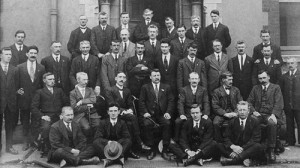
Click on link below for more
http://www.rte.ie/radio1/doconone/documentary-podcast-limerick-soviet-workers.html
Padraig Yeates on August 30, 2012 | Filed Under Uncategorized | Comments Off on Long Lost Limerick Voices
Eastwaller arrested for insulting a British Royal
Socialist and Trade unionist Jailed in 1911
On 27th August, 101 years ago an East Wall resident had just been released from a month long sentence in Mountjoy Jail. Walter Carpenter, with an address at 8 Caledon Road, had been convicted of “using language calculated to lead to a breach of the peace and with having endeavoured to degrade the King in the esteem of his subjects ”.To celebrate his release a welcome home rally was held at Liberty Hall addressed by James Connolly.
On the 101st anniversary of the “Walter Carpenter Free” assembly, Joe Mooney of the East Wall History Group is delighted to take the opportunity to tell the story of the jailing of Walter Carpenter, and also details from the life of a man who was an active Socialist campaigner, an election candidate, ITGWU organiser and General Secretary of Dublin’s “Jewish Union”. Walter was a prominent figure in Dublin during the first quarter of the twentieth century, and it is timely that the East Wall community become more aware of the story of this little known resident.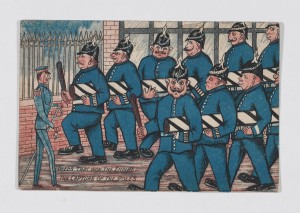
For more just click (more…)
Padraig Yeates on August 26, 2012 | Filed Under Uncategorized | Comments Off on Walter Carpenter – From Sweep to Revolutionary – A Forgotten Figure From 1913 Lockout
What happened in Limerick in 1919 largely stayed in Limerick in 1919. If you want to know how and why a city renowned for its commitment to Faith and Fatherland saw Red that year the following RTE clip is about the best short account you are likely to see this side of 2019. Thanks to Jeremy Hawthorne in Liverpool for drawing it to our attention – not to mention the music
The RTE short can be viewed on http://www.youtube.com/watch?v=js0FR8GkBEo
Meanwhile Alun Parry performs his own Limerick Soviet song at Rumney Folk Club on http://www.youtube.com/watch?v=Hf6P5tiEYZA
Padraig Yeates on August 25, 2012 | Filed Under Uncategorized | Comments Off on Limerick Soviet – A Very Short History
Anyone who wants aerial view of Tall Ships Festival in Dublin can click onto SIPTU link in left hand column or just go to http://www.siptu.ie/media/webcam/
Padraig Yeates on August 24, 2012 | Filed Under Uncategorized | Comments Off on WebCam of Tall Ships on Liberty Hall
Admission to talks and events on Dublin Port’s history, music and folklore during the Tall Ships Festival is free but people need tickets. To obtain one email: tickets@dublintallships.ie. They will be allocated on a first come first served basis
Talks:
August 23rd
Dr Don Bennett – Stories from Deep Sea Dockers – 13.00 to 14.000 – on the MV Cadhla in Grand Canal Square
Sarah Lundberg – The Streets where you walk 14.30 to 15.30- at the Festival CHQ, Custom House Dock
August 24th
Padraig Yeates – Dublin and its Port in a Decade of Revolution, 1913-1922 – 16.00 to 17.00 – Festival CHQ, Custom House Dock
August 25th
Paul O”Brien – Tales from the Docklands – 12.30 to 14.00 on the MV Cadhla in Grand Canal Square
Each of these day there will also be
Historical Walking Tour – 12.00 to 13.30 – Start at Grand Canal Square
Readings by Turtle Bunbury on MV Cadhla – 12.30-13.30
Granuaile Talk and Reading – 15,00 to 16.00 – Festival CHQ, Custom House Dock
Padraig Yeates on August 15, 2012 | Filed Under Uncategorized | Comments Off on Tall Ships, Tall Tales and how to hear them






